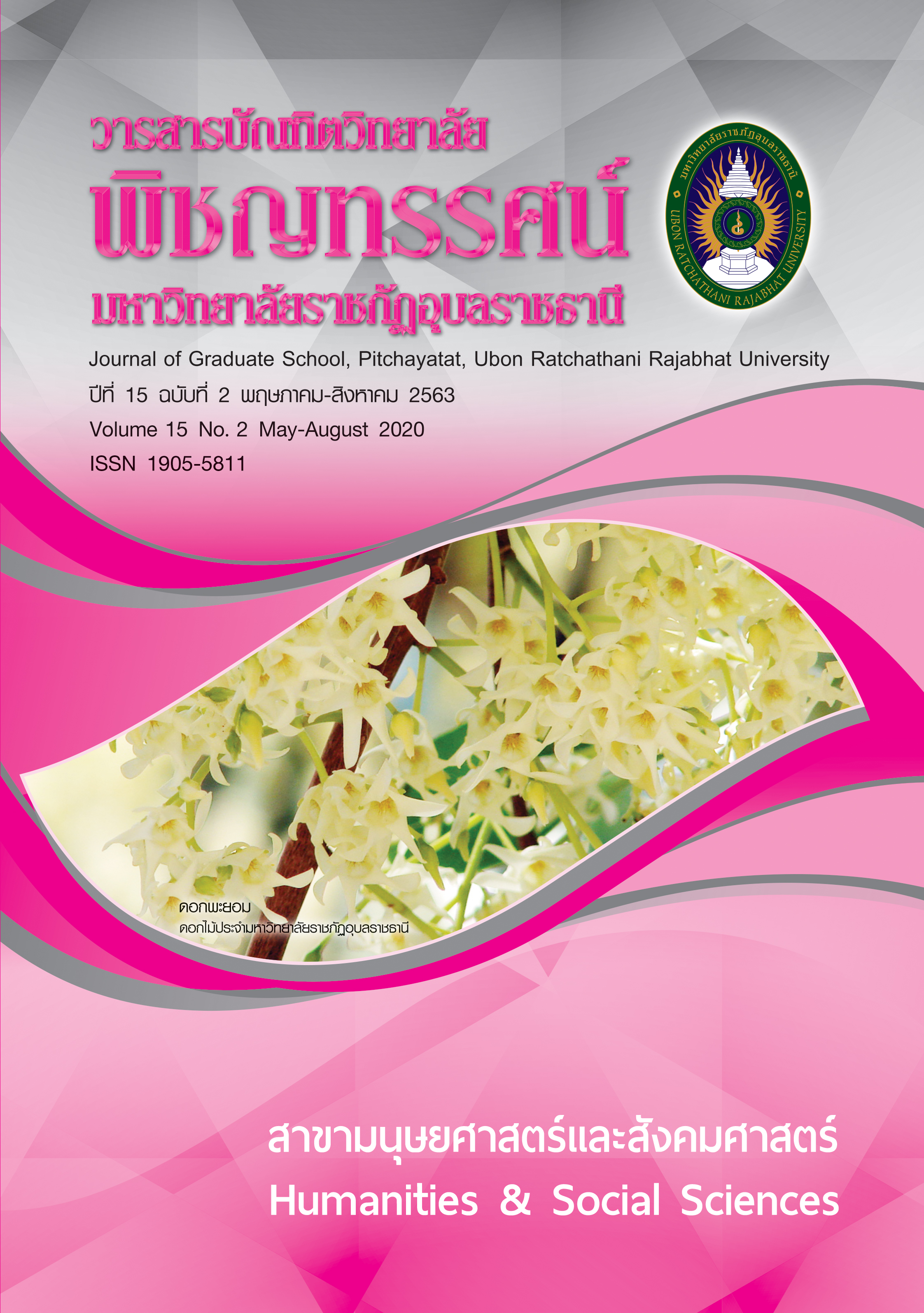รูปแบบการบริหารโรงเรียนมัธยมศึกษาสู่ความเป็นเลิศ
คำสำคัญ:
รูปแบบ, การบริหารโรงเรียนมัธยมศึกษา, ความเป็นเลิศบทคัดย่อ
การวิจัยนี้มีวัตถุประสงค์เพื่อ 1) ศึกษาองค์ประกอบของรูปแบบการบริหารโรงเรียนมัธยมศึกษาสู่ความเป็นเลิศ 2) พัฒนารูปแบบการบริหารโรงเรียนมัธยมศึกษาสู่ความเป็นเลิศ และ 3) ประเมินรูปแบบที่สร้างขึ้น ใช้วิธีวิจัยแบบผสมผสานทั้งเชิงคุณภาพและเชิงปริมาณ แบ่งขั้นตอนในการวิจัยออกเป็น 3 ขั้นตอนคือ 1) การศึกษาองค์ประกอบของรูปแบบการบริหารโรงเรียนมัธยมศึกษาสู่ความเป็นเลิศโดยการสังเคราะห์เอกสารและงานวิจัยที่เกี่ยวข้อง และการสัมภาษณ์จากผู้ทรงคุณวุฒิ จำนวน 7 คน 2) การพัฒนารูปแบบการบริหารโรงเรียนมัธยมศึกษาสู่ความเป็นเลิศ ศึกษาสภาพการบริหารโรงเรียนมัธยมศึกษาสู่ความเป็นเลิศ ตรวจสอบความเหมาะสมของร่างรูปแบบที่ได้จากตอนที่ 1 นำมาประชุมเพื่อระดมความคิดเห็นของการสนทนากลุ่ม และให้ผู้เชี่ยวชาญ/ผู้ทรงคุณวุฒิ ตรวจสอบความเที่ยงตรงเชิงเนื้อหา ได้ค่าดัชนีความเที่ยงตรงเชิงเนื้อหาทั้งฉบับ เท่ากับ .968 แล้วเก็บข้อมูลกับผู้บริหารสถานศึกษาและครูที่ปฏิบัติหน้าที่หัวหน้าฝ่ายงาน จำนวน 25 โรงเรียน โรงเรียนละ 5 คน รวมทั้งสิ้น 125 คน โดยการเลือกแบบเจาะจง ตามเกณฑ์ที่กำหนดคือ โรงเรียนเคยได้รับรางวัลพระราชทาน หรือ โรงเรียนมีผลการทดสอบระดับชาติ มีคะแนนเฉลี่ยของโรงเรียนสูงกว่าค่าเฉลี่ยระดับชาติ หรือโรงเรียนได้รับรางวัลระดับชาติ หรือโรงเรียนมาตรฐานสากล และ 3) การประเมินรูปแบบการบริหารโรงเรียนมัธยมศึกษาสู่ความเป็นเลิศ โดยการสัมมนาอิงผู้เชี่ยวชาญและผู้ทรงคุณวุฒิ
ผลการวิจัยพบว่า
- 1. องค์ประกอบในการบริหารโรงเรียนมัธยมศึกษาสู่ความเป็นเลิศ มี 7 องค์ประกอบ ได้แก่ 1) การใช้แผนกลยุทธ์ 2) ภาวะผู้นำของผู้บริหารสถานศึกษา 3) ความคาดหวังต่อความสำเร็จ 4) กระบวนการบริหารจัดการ 5) การบริหารทรัพยากรบุคคล 6) กระบวนการจัดการเรียนรู้ 7) การมุ่งเน้นนักเรียน
- 2. รูปแบบการบริหารโรงเรียนมัธยมศึกษาสู่ความเป็นเลิศ ประกอบด้วย 1) การใช้แผนกลยุทธ์ เป็นเครื่องมือดำเนินการ 2) การใช้ภาวะผู้นำของผู้บริหารสถานศึกษาที่เหมาะสม ผู้บริหารเป็นแบบอย่าง มีคุณธรรมและก้าวหน้าทางความคิด 3) การวางเป้าหมายที่นักเรียน มีคุณภาพและเกิดประโยชน์สูงสุด 4) การบริหารจัดการที่มีทิศทางชัดเจน เน้นคุณภาพรอบด้าน 5) กระบวนการจัดการเรียนรู้ ปรับวิธีเรียนเปลี่ยนวิธีสอนตามความสนใจและความถนัดของผู้เรียน 6) การบริหารทรัพยากรบุคคล มีการประสานของทีมงาน มีความผูกพันต่อสถานศึกษา มีส่วนร่วมคิดร่วมทำ และ 7) ความคาดหวังต่อความสำเร็จ
- 3. ผลการประเมินรูปแบบการบริหารโรงเรียนมัธยมศึกษาสู่ความเป็นเลิศ โดยการสัมมนาอิงผู้เชี่ยวชาญและผู้ทรงคุณวุฒิ จำนวน 9 คน พบว่ามีความเหมาะสม มีความเป็นไปได้ มีความสอดคล้อง และมีความเป็นประโยชน์ในระดับมากที่สุดทุกองค์ประกอบ
คำสำคัญ: รูปแบบ การบริหารโรงเรียนมัธยมศึกษา ความเป็นเลิศ
เอกสารอ้างอิง
ทรงพล เจริญคำ. รูปแบบความเป็นเลิศของโรงเรียนสังกัดกรุงเทพมหานคร. วิทยานิพนธ์ปรัชญาดุษฎีบัณฑิต มหาวิทยาลัยศิลปากร, 2552.
ธีระ รุญเจริญ. ความเป็นมืออาชีพในการจัดการและบริหารการศึกษาในยุคปฏิรูปการศึกษา. กรุงเทพฯ: สำนักพิมพ์ข้าวฟ่างจำกัด, 2550.
พิชิต ฤทธิ์จรูญ. การวิจัยประเมินผลการจดการศึกษาขององคการบริหารส่วนตำบล. กรุงเทพฯ: สำนักงานเลขาธิการสภาการศึกษา กระทรวงศึกษาธิการ, 2554.
สมคิด บุญยะโพธิ์. รูปแบบการบริหารสถานศึกษาขั้นพื้นฐานสังกัดสำนักงานเขตพื้นที่การศึกษาประถมศึกษาสู่ความเป็นเลิศ. วิทยานิพนธ์ปรัชญาดุษฎีบัณฑิต มหาวิทยาลัยศิลปากร, 2555.
สุริยา ห้าวหาญ. รูปแบบการบริหารสู่ความเป็นเลิศของสถานศึกษาสังกัดสำนักงานเขตพื้นที่การศึกษามัธยมศึกษา. วิทยานิพนธ์การศึกษามหาบัณฑิต มหาวิทยาลัยมหาสารคาม, 2558.
สำนักบริหารงานการมัธยมศึกษาตอนปลาย. สำนักงานคณะกรรมการการศึกษาขั้นพื้นฐาน. คู่มือ การติดตามและประเมินผลการจัดการศึกษามัธยมศึกษา ประจำปีการศึกษา 2559. กรุงเทพฯ: 2559.
สำนักงานเลขาธิการสภาการศึกษา. กระทรวงศึกษาธิการ. แผนการศึกษาแห่งชาติ พ.ศ. 2560–2579. กรุงเทพฯ: พริกหวานกราฟฟิคจำกัด, 2560.
Austin, G>E> and D. Reynolds, Managing for Improved School Effectiveness: An International survey School Organization. 10, 2-3 (1990): 67-178.
Baskett, S., and Miklos, E. Perspectives of effective principals. The Canadian Administrator, 32,1(1992): 1-10.
Pak Tee Ny. “Quality assurance in the Singapore education system in an era of diversity and innovation,” Education Research for Policy and practice. 6, 3 (October 2007) :235-247.
Sergiovani . The Principalship: A reflective practice perspective. 2nd ed. Needham Heights, MA: Allyn and Bacon, 1991.
ดาวน์โหลด
เผยแพร่แล้ว
รูปแบบการอ้างอิง
ฉบับ
ประเภทบทความ
สัญญาอนุญาต
บทความทุกเรื่องได้รับการตรวจความถูกต้องทางวิชาการโดยผู้ทรงคุณวุฒิภายนอกอย่างน้อย 3 คน ความคิดเห็นในวารสารพิชญทรรศน์เป็นความคิดเห็นของผู้นิพนธ์มิใช่ความคิดเห็นของผู้จัดทำ จึงมิใช่ความรับผิดชอบของวารสารพิชญทรรศน์ และบทความในวารสารพิชญทรรศน์สงวนสิทธิ์ตามกฎหมายไทย การจะนำไปเผยแพร่ต้องได้รับอนุญาตเป็นลายลักษณ์อักษรจากกองบรรณาธิการ





